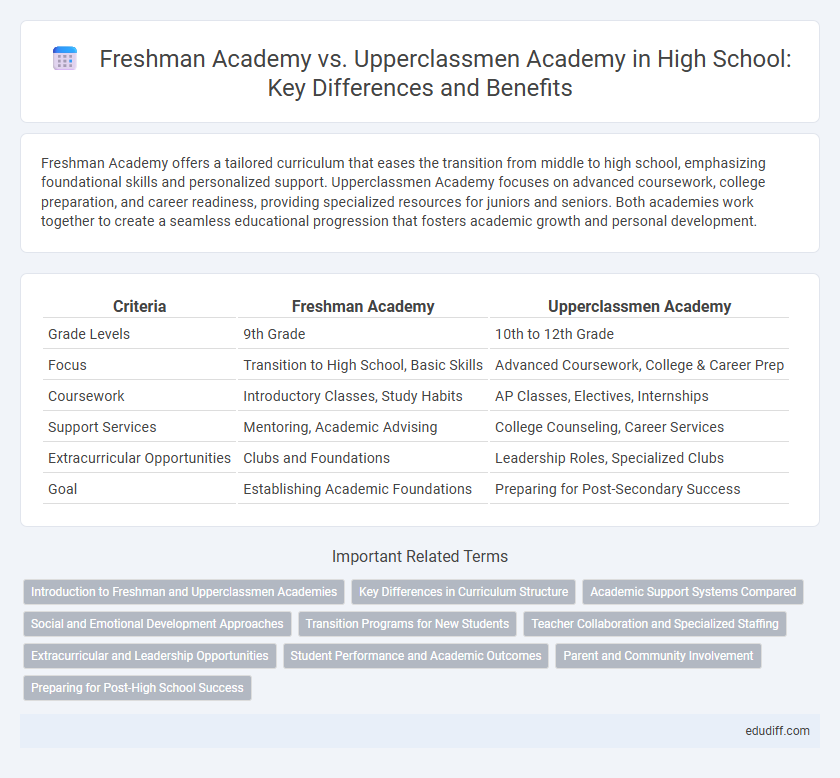Freshman Academy offers a tailored curriculum that eases the transition from middle to high school, emphasizing foundational skills and personalized support. Upperclassmen Academy focuses on advanced coursework, college preparation, and career readiness, providing specialized resources for juniors and seniors. Both academies work together to create a seamless educational progression that fosters academic growth and personal development.
Table of Comparison
| Criteria | Freshman Academy | Upperclassmen Academy |
|---|---|---|
| Grade Levels | 9th Grade | 10th to 12th Grade |
| Focus | Transition to High School, Basic Skills | Advanced Coursework, College & Career Prep |
| Coursework | Introductory Classes, Study Habits | AP Classes, Electives, Internships |
| Support Services | Mentoring, Academic Advising | College Counseling, Career Services |
| Extracurricular Opportunities | Clubs and Foundations | Leadership Roles, Specialized Clubs |
| Goal | Establishing Academic Foundations | Preparing for Post-Secondary Success |
Introduction to Freshman and Upperclassmen Academies
Freshman Academy provides tailored support for ninth graders, emphasizing foundational skills and easing the transition into high school through specialized courses and advisory programs. Upperclassmen Academy targets juniors and seniors with advanced coursework, college readiness resources, and career exploration opportunities to prepare students for post-secondary success. Both academies collaborate to create a structured high school experience that fosters academic growth and personal development.
Key Differences in Curriculum Structure
Freshman Academy centers on foundational skills and core subjects such as math, English, science, and social studies to build essential knowledge for academic success. Upperclassmen Academy offers specialized courses, advanced electives, and opportunities for college and career readiness, including AP classes and internships. The distinct curriculum structures reflect a transition from broad skill-building to focused, goal-driven learning tailored to upperclassmen preparedness.
Academic Support Systems Compared
Freshman Academy provides structured academic support with dedicated mentors, smaller class sizes, and personalized tutoring designed to ease the transition into high school. Upperclassmen Academy emphasizes specialized guidance through advanced coursework support, college preparation resources, and targeted counseling for career pathways. Both academies utilize data-driven intervention strategies, but Freshman Academy focuses on foundational skill-building while Upperclassmen Academy prioritizes academic enrichment and post-secondary readiness.
Social and Emotional Development Approaches
Freshman Academy programs prioritize social-emotional learning by integrating peer mentoring, collaborative projects, and resilience training to support students' transition into high school. Upperclassmen Academy models often emphasize leadership development, conflict resolution skills, and emotional regulation strategies to prepare juniors and seniors for post-secondary challenges. Both academies employ tailored workshops and counseling services to address age-specific social and emotional needs, enhancing student engagement and well-being.
Transition Programs for New Students
Freshman Academy offers tailored transition programs designed to support new students in adapting to high school rigor through orientation sessions, peer mentoring, and skill-building workshops. Upperclassmen Academy focuses on advanced academic planning and leadership development to prepare juniors and seniors for college and career readiness. Both academies provide structured environments that address the unique developmental stages of their students, ensuring a smooth progression from entry-level adjustment to upper-level academic success.
Teacher Collaboration and Specialized Staffing
Freshman Academy and Upperclassmen Academy differ significantly in teacher collaboration and specialized staffing, with Freshman Academy often emphasizing integrated support teams to address the unique transitional needs of ninth graders. Upperclassmen Academy typically features subject-specific experts and specialized staff geared towards advanced coursework and college readiness, fostering collaboration among teachers who focus on discipline-specific strategies. This targeted staffing approach in both academies enhances student performance by aligning instructional methods with developmental stages and academic goals.
Extracurricular and Leadership Opportunities
Freshman Academy offers a structured introduction to extracurricular activities, with programs designed to foster leadership skills among new high school students, such as student council initiation and club participation workshops. Upperclassmen Academy provides advanced leadership opportunities through roles like club officers, peer mentors, and event organizers, allowing students to apply and develop their leadership experience in diverse extracurricular settings. Participation rates in leadership positions are significantly higher among upperclassmen, reflecting their increased access to exclusive programs and responsibilities.
Student Performance and Academic Outcomes
Freshman Academy programs improve student performance by offering tailored support, structured routines, and focused curriculum designed to ease the transition into high school. Upperclassmen Academies emphasize career readiness and advanced coursework, resulting in higher graduation rates and improved standardized test scores. Data shows students in Freshman Academies demonstrate better engagement and retention, while Upperclassmen Academies boost college admissions and vocational proficiency.
Parent and Community Involvement
Freshman Academy programs prioritize parent and community involvement through regular orientation sessions and targeted workshops that help families support students' transition into high school. Upperclassmen Academies engage parents and community partners by facilitating career fairs, college preparation events, and internship opportunities that connect students with real-world experiences. Both academies leverage local business partnerships and community volunteers to enhance educational support and foster a collaborative environment for student success.
Preparing for Post-High School Success
Freshman Academy emphasizes foundational skills, college readiness, and career exploration to build a strong academic base for post-high school success. Upperclassmen Academy focuses on advanced coursework, internships, and college application guidance, ensuring students are thoroughly prepared for higher education and career opportunities. Both programs align with personalized learning plans and support systems that enhance student outcomes beyond high school.
Freshman Academy vs Upperclassmen Academy Infographic

 edudiff.com
edudiff.com